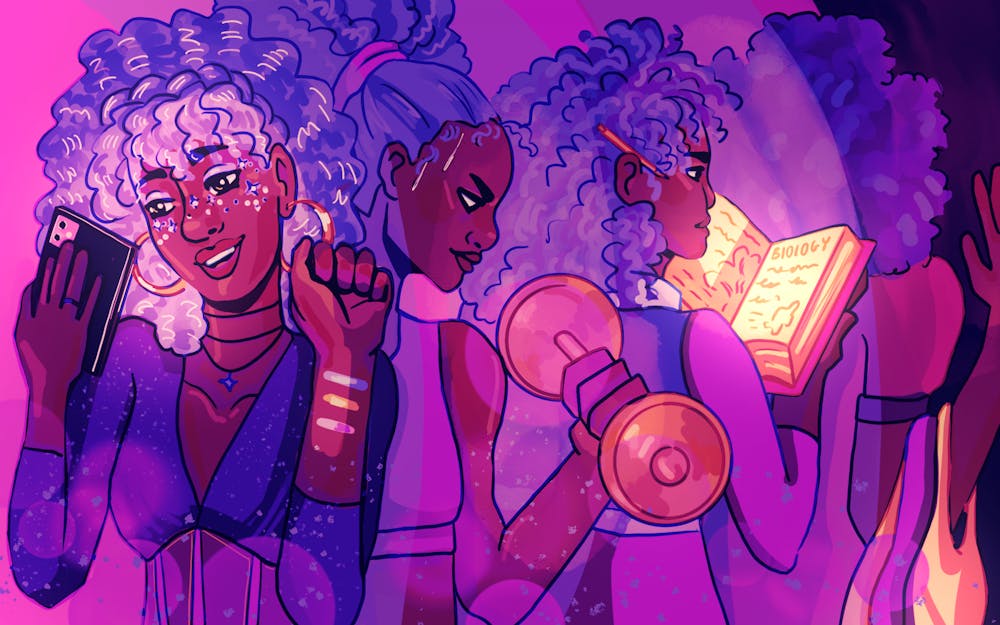On multiple social media platforms, especially TikTok, I’ve noticed a popular trend of “protecting your peace.” While the phrase basically means practicing healthy habits and not engaging with people who bring down your energy, I find the way the trend has manifested, especially given the context of our capitalistic society, to be too extreme.
On TikTok, protecting your peace presents itself as a lifestyle of discipline and tunnel vision: going to the gym daily, journaling, maintaining a side hustle and most importantly, closing yourself off to any outside interaction or influence that could distract you from so-called self-improvement — aka, building your capital.
This self-improvement can take the form of ditching friends who spend their time on habits you do not consider healthy and simply not going out to parties and bars — something many college students do. Some people posting on social media about the topic joke that, through practicing this lifestyle, they no longer talk to many people or anyone at all, since nobody understands their dedication to self-improvement.
The idea of protecting your peace in the way currently being pushed on social media is a harmful trend that only further encourages the isolation and competition that capitalism already facilitates through values of individualism and the myth of hustle culture. We should celebrate unscripted lives that include spending time with friends, opening up to others and doing things that fill us with joy and love, without consideration of whether these things make us more optimal workers or consumers.
[Related: OPINION: Beyond the Amazon storefront: the harmful effects of overconsumption]
I do not mean to say that habits like going to the gym and being mindful of who we spend time with cannot be beneficial. It is important to respect ourselves and draw boundaries where necessary. Unfortunately, the trend of protecting your peace — in combination with the crushing pressures of capitalism to achieve maximum productivity — corrupts the ideas of self-care and self-improvement.
These ideas, while healthy at face value, are often weaponized by capitalistic values to be used only to make a person more productive or consume more things. Some social media creators push having a side hustle in addition to a 9 a.m. to 5 p.m. job, while others push buying 20 different skincare products that will supposedly change our lives.
I encourage people to spend time in shared spaces like libraries, museums, parks or coffee shops. These are generally referred to as “third places” — somewhere outside of work and home that is shown to build community. And lucky for us, IU’s campus and the city of Bloomington are teeming with them. Bring friends or go alone to work alongside others or possibly meet new people with similar interests.
Accept or send spontaneous invites to go out for dinner, go to a party or even just go on a walk with friends. Reach out to your friends and family when you need to talk. Offer support to them when they need the same.
Prolonged isolation is rarely the key to peace and fulfillment. In fact, the Survey Center on American Life published a 2021 survey reporting that Americans have fewer friends, are less satisfied with their friendships and spend more time alone than they did in 1990.
[Related: OPINION: 2023: The year you take care of yourself]
Much of these changes could be attributed to things like the prevalence of smartphones and the impact of the pandemic. But coupled with the effects of capitalism, we should be wary of letting them continue. Going out dancing or drinking with your friends does not make you a bad or lazy person with twisted priorities. Waking up later than the crack of dawn and not spending all your free time drop shipping on Amazon does not make you less worthy of financial security.
I am not advocating for you to keep people who hurt you in your life. I am not advocating for you to go out drinking every night if that makes you feel bad about yourself. I simply think it is essential, especially for young adults and college students, to nurture our relationships and communities and give grace to those around us. That is what will bring you peace.
Leila Faraday (she/her) is a freshman studying policy analysis.






